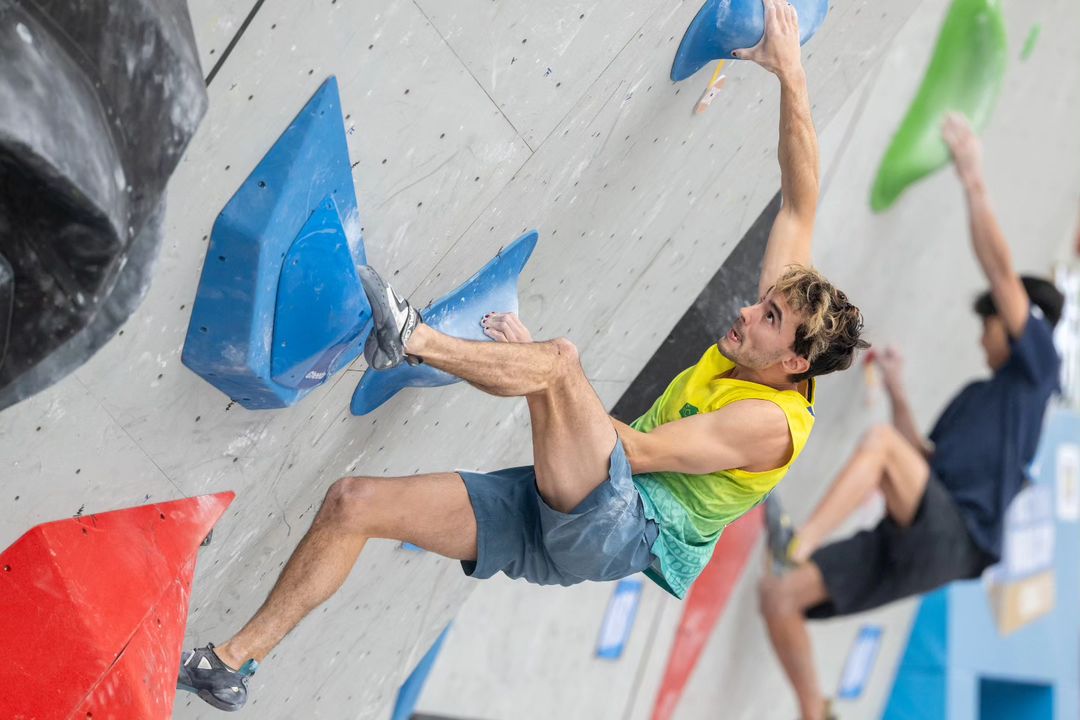FOR OLYMPIC SPORT CLIMBER Campbell Harrison, his sport has always been a source of fun, even before it was on the Olympic program. “I’ve been climbing since 2006 when I was eight or nine. I thought climbing looked like a fun thing to do so I asked my dad if we could give it a go,” the 27-year-old from Dandenong tells Men’s Health. “He took me and my siblings down to a local gym and I just fell in love with it pretty fast.”
Back then, climbing wasn’t much more than an entertaining pastime – and it still is for many people today – but it hadn’t yet been professionalised and become an Olympic sport. That changed in 2020, when sport climbing was added to the event schedule for the Tokyo Olympics. Suddenly, Harrison wasn’t a recreational climber, he was a potential Olympian.
“Initially I thought it was just a very cool sensation and a unique feeling to create these paths against gravity,” he says. “Once I started competing and saw the progression and the transition from hard work into results, and making those gains, it was really exciting for me – I found that whole process really addictive.”
Amid the restrictions of the COVID pandemic, Harrison ultimately pulled out of the qualifiers for the Tokyo Games, choosing to rush home rather than risk getting stuck interstate due to border closures. “It was like, ‘You need to get over the border before midnight or you’re going to be in hotel quarantine’, which meant that I wasn’t going to see my family before my sister started chemotherapy. So I had to make this very, very quick decision and we decided to go home.”
For Harrison, while missing his sport’s Olympic debut was disappointing, it did come with a surprising upside – the ability to focus on improving and making breakthroughs in his domestic competition, rather than on the international stage. He spent lockdown honing his craft and staying in shape, preparing for the second chance that would inevitably come – another shot at the Olympics.
Harrison not only qualified for the Paris Games, he’s already made his Olympic debut, finishing 19th in the boulder segment of the boulder and lead event. On Wednesday night AEST, he’ll complete the lead portion and see where he ranks among the world’s best.

INSTAGRAM | @campbell_harrison547
How does sport climbing work?
In case you’re unfamiliar with the rules, sport climbing is designed to be challenging, both physically and mentally, and is typically split into three distinct disciplines: speed, boulder and lead. At Tokyo 2020, all three were combined into a single event, but at Paris 2024, speed has been granted its own event, while boulder and lead remain combined. Boulder and lead is what Harrison has qualified for in Paris.
In bouldering, the goal is to scale multiple challenging routes called ‘problems’ with minimal attempts within a timespan. As Harrison explains, “Every round it’s a completely new course that has been created [by a ‘route setter’]. Much of the result hinges on the route setting – it has to be this really sustained or gradual increase in difficulty.” Lead revolves around a similar concept, except the problem is 15 metres tall and the aim is to climb as high as possible in six minutes.
Like any other Olympic sport, climbing requires an immense amount of dedication to training and diet. The latter is something that Harrison pays extra attention to, as a vegetarian. “I’m a passionate vegetarian and really enjoy eating this way,” he says. “It makes me feel really good and it’s a good diet for sport climbing as well because we have to have muscle and power but also be lean, so I think it’s a good balance.”
View this post on Instagram
Regardless of whether or not he wins a medal, the Olympics will be the experience of a lifetime for Harrison. “The whole experience is going to be so cool,” he says. “I love cities and places that are super alive and busy, and the Olympic Games is going to be the epitome of that.”
The weight being placed upon the Games doesn’t mean it’s all downhill from here though. Harrison is more than prepared to return to regular life once the Games are over, thanks in part to the support provided by the Athlete365 Mind Zone within the Olympic village. “A friend of mine competed at Tokyo and had a hard time dealing with how quickly it was over,” Harrison recounts. “It’s good to know that there will be [counsellors available at the Athlete365 Mind Zone in the Village and on call for athletes for four years afterwards]. It’s always good to have information you can draw from.”
Having survived its Olympic debut to maintain inclusion at a second Olympic Games, like Harrison, sport climbing is only just getting started. Sport climbing is skyrocketing in popularity, and much of its progress is happening at the grassroots level. “When I started climbing, there were maybe three or four gyms in Victoria and now there’s 20,” Harrison says. “I work at a gym and we might have 600 people come in a day and 200 of them will be the first time they’ve ever come to a climbing gym. For a lot of them, it feels like being a kid in the playground again.” For sport climbing, the only way is, quite literally, up.

INSTAGRAM | @campbell_harrison547
Related:
Olympic breaker Jeff Dunne breaks down how he mentally tackles his sport
















